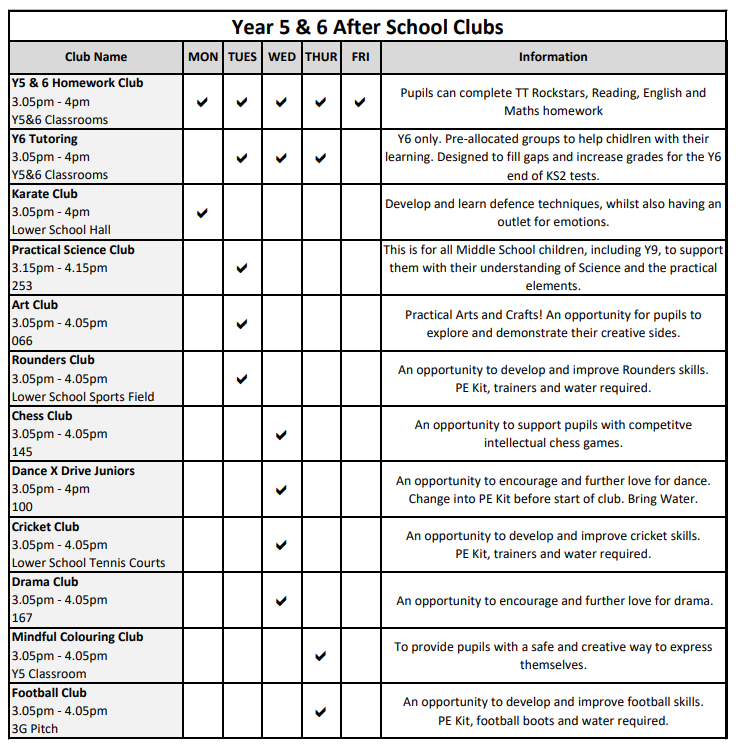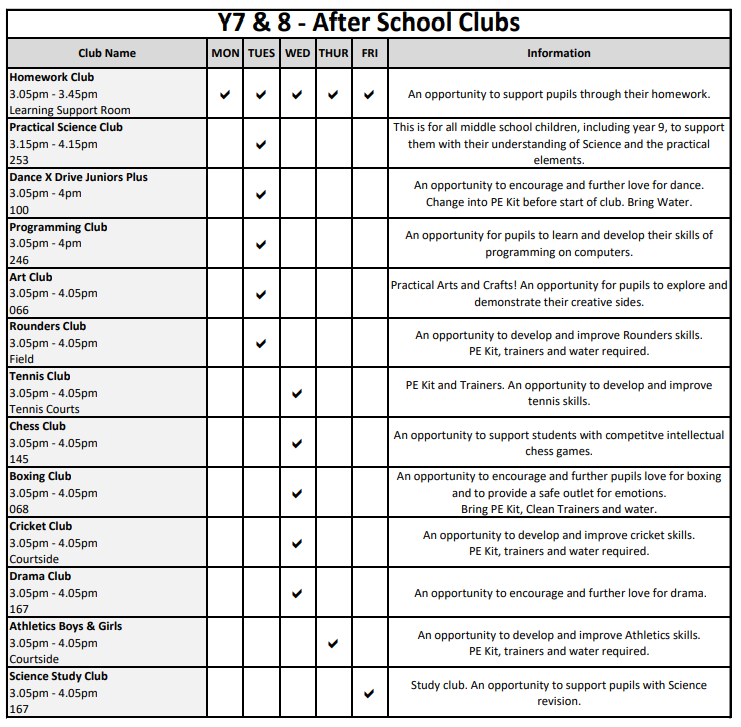- Home
- Middle School
Middle School
Year 5 through to Year 9
Pupils within the Middle School are finishing their Primary education and making the important transition from Year 6 to 7. The Middle School ensures consistency of leadership and support for pupils as they enter secondary education. It also ensures that the pupils understand what is expected from them as they enter the next phase of their education, as well as receive the guidance and support that they need to be truly successful and happy. At the end of Middle School, Year 9 pupils make their GCSE option choices and prepare for the Upper School.
"I have always believed that Education is a unique journey. We are all given the privilege of taking part, but we all need the magic to make sure that it works for everyone. Middle School is the glue that binds it all together, creating a seamless adventure where every child feels safe, supported, happy and challenged."
Mr Steve Davies
Role of the Tutor in Middle School
Every pupil in Middle School is allocated to a tutor group. These groups (smaller than regular classes) meet twice daily in the morning and afternoon to register, but tutor time is much more than that, and the relationship between tutor, tutees and parents is very important.
The tutor should be the first port of call for parental contact – a list of tutors for Middle School is below, complete with email addresses. Tutors are ideally placed to support pupils with any pastoral issues, and are given information to ensure any behaviour and attendance issues are tackled quickly.
Morning Tutor Time:
During morning tutor time the role of the tutor is to check pupils are “Ready to Learn.” This means checking the pupils have and are aware of the following:
- Equipment – pen, pencil, rubber, green pen, ruler, reading book and Yondr pouches.
- Uniform is correct according to policy.
- Merits, sanctions and attendance checks and check-ins with pupils.
- A daily act of Collective Worship as a tutor group.
Afternoon Tutor Time:
In the extended time (30 minutes for afternoon tutor time) pupils will engage in a variety of activities, including:
- Collective Worship as a year group once per week, in addition to the morning Collective Worship.
- The Big Debate – a debate and discussion of a relevant current, moral or spiritual issue.
- Reading – either individually, or as a class.
Curriculum
Pupils in Middle School experience a wide range of subjects and learning opportunities.
In both the secondary and primary parts of Middle School, pupils have a significant focus on the core subjects of English, maths, science and religious education.
All pupils also study the humanities (geography and history), the full range of the arts (dance, drama, visual art, music) as well as design and technology, physical education and computing.
What do pupils actually study in Middle School?
- English
- Maths
- MFL
- Computing
- Science
- Design and Technology
- Art
- Dance
- Drama
- Music
- PSHE
- Physical Education
- History
- Geography
- Religious Education
Homework in Middle School
Studying outside of lesson can complement and support the learning in classrooms.
Our focus in Middle School is to make homework very focused on the key skills of reading, writing and maths, as well as enthusing our pupils in learning by engaging in substantial projects.
Homework is set as follows in Middle School:
- English work - primarily reading will be set every week; the expectation being that pupils in Middle School read 4 or more times per week at home for ½ an hour.
- Maths work (set via an appropriate platform for key stage; the expectation that pupils engage with the work 4 or more times per week).
- Project work based around faculties – Humanites, PE, MFL D&T, Art and Science will set a project (one per term by a faculty) for pupils to complete as homework for submission at the end of term.
- Celebration and reward will reflect high levels of engagement with maths and English work on a weekly/termly/annual basis. Projects will be celebrated and rewarded for high levels of commitment. Pupils who engage with homework regularly and complete all homework projects will be eligible for rewards and trips at the end of term.
Extra Curricular Offer
The Middle School offers a wide range of extra-curricular clubs and activities, including sports, chess, catch up and tutoring opportunities, as well as computing, arts and games.
The range we offers changes and develops each term, but always includes homework club, a great opportunity for pupils to get support with their reading, writing and maths.
The full current list of extra-curricular clubs is available below:


Year 8 Options Process
Year 8 Arts Option
Pupils in Year 9 have a chance to specialise in an area of the arts they enjoy, or would like to explore further. To give this opportunity, all pupils in year 8 can select an ‘Arts Option’ (this process takes place between January – March of Year 8). Pupils can select from fine art, photography, graphics, media, dance, music and drama to specialise in, and their timetable in Year 9 will have additional lessons of this subject.
Pupils have expressed how much they have enjoyed the specialised lessons, and have made excellent progress in their chosen subjects since we have run this programme.
Arts in the Academy are thriving, and this year – the first after our new year 8 programme of specialisation – more pupils have selected arts options than ever. Studying the subject in Year 8 is NOT a pre-requisite for taking the subject at GCSE level, and pupils may choose in the Year 9 options process to continue their arts studies, or pursue other options.
Any questions on the Year 8 option programme, please approach Mr Bean (Director of the Arts) – mbean@thejohnwallisacademy.org
Reporting and Assessment
Reporting and Assessment
In Middle School, pupil work is assessed and marked regularly so that pupils and teachers know exactly how an individual can improve their performance and make rapid progress.
The Middle School reports to parents in the following ways:
- Performance and improvement in externally marked English and maths assessments (GL assessments) will be reported to parents in September for Years 7, 8 and 9.
- Written reports (including SATs results for year 6) will be completed for Years 5 and 6 in July.
- Parents Evening will take place between terms 2-4 for Year 7, 8 and 9, so parents can be updated on progress and levels of work.
- Years 5 and 6 will have two parents evenings – in November and March.
- At the end of term 4 all year 7-9 pupils will receive a formal written report for all subjects. This will include comments on current performance, specific ways to improve and successes.
- At the end of the academic year, pupils in years 7-9 complete an end of year assessment or test. Scores in this and how they compare to the year group average will be reported to parents.
Year 9 Options Process
Year 9 Options Process
As pupils transition to Year 10, they have an opportunity to personalise their curriculum with a wide range of option choices. As pupils finish their time in the Middle School, they will receive information (in the form of parents evenings, reports and a dedicated evening on the options process) on the GCSE options process.
Pupils will all study as a suite of core subjects: English Language, English Literature, mathematics, double science, religious education and core (non-examined, statutory) physical education. Alongside this they can select two additional subjects from the humanities, languages, arts, sport and vocational subject areas. In addition high achieving and attending pupils will be given the opportunity to study for an additional out of school hours additional GCSE subject.
Detailed information about options can be obtained from Mr Davies, and will be shared with parents/carers when their child is in year 9.
The Year 9 Options handbook can be found here
Year 6 to 7 Transition
Year 6 to 7 Transition
The John Wallis Church of England Academy prides itself on the completeness and thoroughness of our transition programme. Moving from a small primary to a large secondary school can be daunting for pupils and parents alike, and we have done much to mitigate anxiety, and encourage confidence in that transition.
Parent and pupil surveys have shown that over 95% of stakeholders* have responded that transition was well managed, organised and that the new year seven child has settled well into secondary school.
As an all-through academy, we have advantages that other secondary schools do not, in that our staff have an in-depth and detailed understanding of the key stage 2 curriculum, as our secondary and primary staff work closely together.
In the course of our transition we offer:
- Visits by Deputy Head of School, SENDCO and Heads of Year to primary feeders to share information face-to-face.
- An extended transition week, where our more vulnerable pupils (as identified by primary feeders) are given additional days to settle in.
- A thriving summer school, highly attended by our incoming year 7.
- Two full days for all pupils to acclimatise to the secondary environment.
- A first day, where year 7 are the only pupils invited in, so they can explore the school with fewer pupils around them to help them settle and find their way around.
- A ‘Meet the Tutor’ evening for year 7 for parents to meet tutors face-to-face in the first term to discuss how they have settled in.
The Year 7 Tranision Booklet can be found here

